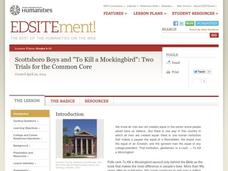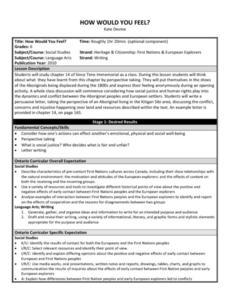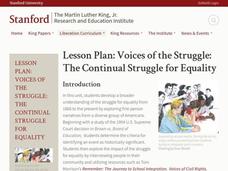Curated OER
he Media and Social Justice Around the World
Pupils will activate literacy skills in internet medium, and will use reading, critical thinking and writing skills as they work with their groups to collect and organize information. The follow up activity will allow them to augment...
Stanford University
Observing Human Rights Day
How much intervention is appropriate for America to take in cases of human rights violations? Class members ponder a question that has lingered since the birth of America with a series of primary sources that reflect the degree to which...
National Endowment for the Humanities
Scottsboro Boys and "To Kill a Mockingbird": Two Trials for the Common Core
Here's a must-have resource for anyone reading To Kill A Mockingbird or using Harper Lee's award-winning novel in a classroom. The packet contains Miss Hollace Ransdall's first-hand, factual account of the trials of the Scottsboro Boys,...
Curated OER
Juvenile Crime in America: What Do We Value
Students investigate the statistical data provided in the Juvenile Offenders and Victims National Report. Students work in groups to create a story around a juvenile crime using the perspective of the juvenile offender, and another in...
Curated OER
Symbols and Landmarks
Third graders study American national holidays, symbols, songs and landmarks. They appreciate the meaning and significance of our nation's ideals of liberty, justice and equality.
Curated OER
Children's Accountability for Their Crimes
Learners participate in a round-table discussion about the juvenile justice system and investigate the 'age of accountability' debate. They write a persuasive essay supporting or refuting the punishment received by the children discussed...
Curated OER
Nonviolence as a Tool for Change Lesson 2
Learners explore nonviolent protest. In this Civil Rights lesson, students read the essay "Nonviolence and Racial Justice." Learners present the information they gleaned from the essay to their classmates in order to consider how...
Curated OER
How Would You Feel?
Sixth graders put themselves in the shoes of aborigines who were displaced from their homes in the 1800s by Europeans who came in and took their land from them. They discuss the social injustices suffered by these people, and write...
Stanford University
Voices of the Struggle: The Continual Struggle for Equality
As part of a study of the Civil Rights Movement from 1868 to the present, class members examine first person narratives, the Supreme Court case Brown v. Board of Education, and other significant events in civil rights history....
University of Chicago
What IS the Difference Between Sunni and Shi'ite Muslims?
The distinction between Shiite and Sunni Muslims is an often misunderstood concept, yet very important for its implications in global affairs and for a more comprehensive understanding of the religion of Islam.
University of Wisconsin
Why Did the Triangle Fire Occur?
An investigation of the 1911 New York City Triangle Shirtwaist Factory fire leads class members to examine primary and secondary source materials related to the event and apply what they learn about the working conditions at the time to...
Curated OER
Relationships, Rules, and Responsibilities
First graders identify jobs in the environment. In this social justice lesson, 1st graders describe rules to protect the environment and the roles specific jobs play. Students construct environmental rules for an imaginary town.
Curated OER
Juvenile Justice - Adjudicatory Hearing
Students conduct a mock hearing in which they clearly define the role of prosecutor and defense council, while also determining the elements of robbery and defense of duress.
Curated OER
American Justice: The Texas Cheerleader Plot
Students watch a video about one woman who planned to commit murder because of a cheerleading scandal.
Curated OER
The March Continues
Students explore the Civil Rights Memorial. In this character development and U.S. History lesson, students employ reading comprehension strategies while reading a news article about the Civil Rights Memorial. Students work in groups to...
Curated OER
Building a Model Courtroom
Students construct a model of the Supreme Court's courtroom. They design the courtroom in such a way so that the architecture and furnishings in the courtroom represent the neutrality and power of the court.
Curated OER
Mock Trial
Students rewrite a traditional fairy tale to represent the viewpoint of the villain. They participate in a mock trial of that villain in which all regular court participants (judge, jury, defendant, witnesses, plaintiff, etc) play roles.
Curated OER
Public Trust and Confidence
Students analyze the judiciary system. In this government lesson plan, students participate in a class discussion on methods to prevent unfairness in the Judicial courts.
Curated OER
The Power of Autobiographical Writing
Students explore the concept of injustice. In this nonviolent resistance lesson, students discuss how autobiographical writing may be used to promote justice. Students read an excerpt from Gandhi's autobiography and determine how his...
Curated OER
Why a Mock Trial?
Learners participate in a mock trial. They discover how U.S. courts resolve conflicts.
Curated OER
Fair Dinkum!
Students define fairenss, justice and equity as they are known to them. In groups, they role-play varoius scenerios and discuss their reactions to it. As a class, they share experiences in which they were treated unfairly and what could...
Advocates for Human Rights
Mock Immigration Court
As part of a unit study of immigration, class members participate in a mock Immigration Court activity in which they argue four cases before an immigration judge.
Center for Civic Education
The Equal Rights Amendment in the 1970s and Today
Discover the fascinating history of the Equal Rights Amendment and discuss the major implications and considerations associated with it today. Here you will find background information on the topic, a graphic organizer summarizing...
Carolina K-12
Are You a Democrat or a Republican? Are You Really?
Have new or soon-to-be voters examine different political parties and their platforms as they figure out which one aligns most with their beliefs. After taking a few online quizzes, students split into pairs to discuss and then...

























